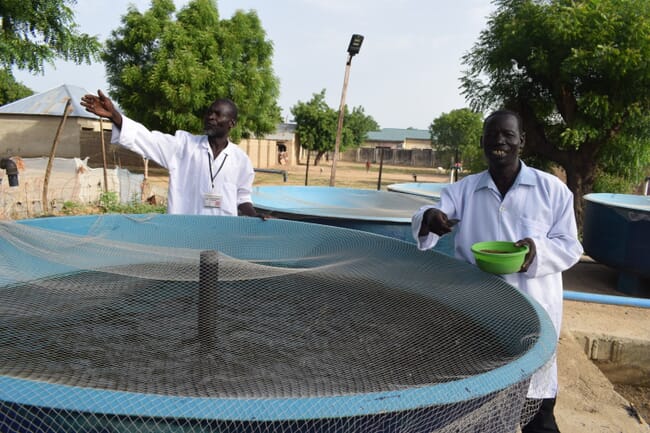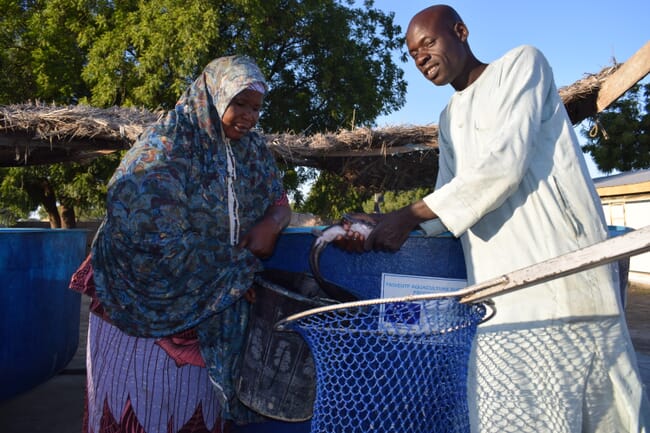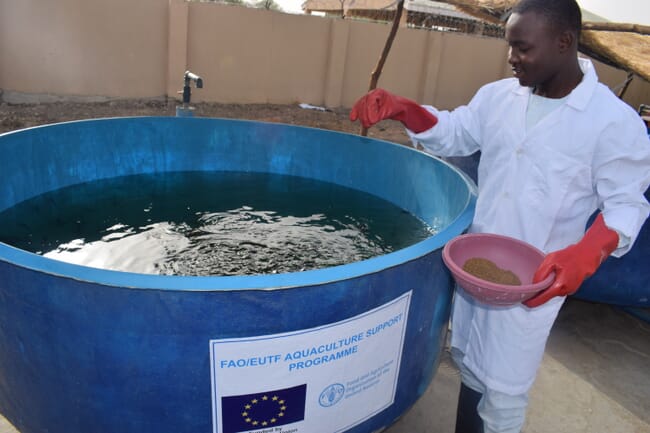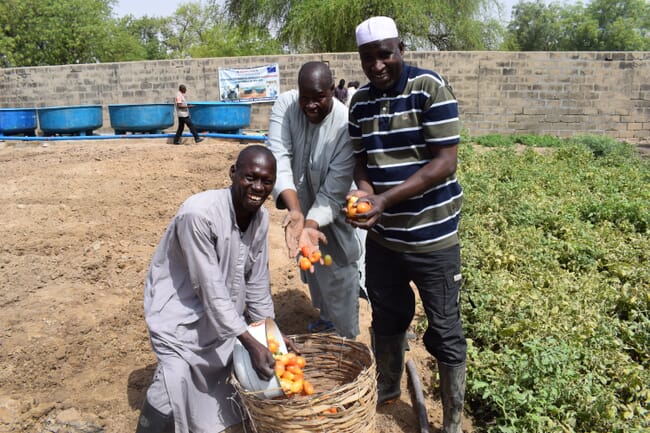
© Opeyemi Olagunju, FAO
Kyari lost some of his relatives, who were killed in various attacks. He was lucky to have survived and fled alongside a few of his siblings. Their displacement meant they lost their fishing livelihood – an important source of food and income, especially for small households in the region.
“I was handicapped and redundant,” he told The Fish Site. “I didn’t have anything else to do. I have always been into fishing. That is what I’d known all my life, but I lost everything.”
The Boko Haram (the group’s name translates as “Western education is forbidden”) insurgency has killed over 30,000 people and displaced more than 2 million.
Kyari, alongside his wife, two children and seven siblings, now lives in the Wakane Internally Displaced Persons (IDP) camp in Gwoza (a suburb of Borno State), created by the Nigerian government. “I am living at the mercy of the Food and Agricultural Organization of the United Nations,” he said.
FAO aquaculture to the rescue
The insurgency has left Kyari and many IDPs jobless. To help them start afresh, the Food and Agricultural Organization (FAO), in partnership with the World Food Programme (WFP) and United Nations Women, in 2018 kicked off an agricultural livelihood-support programme for farmers taking refuge in various IDP camps in Borno State.
Funded by the European Union Trust Fund, the project was created to bring peace and stability and social inclusion to the region, and to stimulate the economic recovery of the displaced communities. The project’s aquaculture programme was launched in April 2019 with an initial 50 beneficiaries, grouped in five clusters, with each cluster supporting 10 people.

© FAO/Opeyemi Olagunju
Ruwan Ubeysekara, the FAO’s emergency programme coordinator and head of programme for north-east Nigeria, said: “One of the components of the project was to support redundant individuals through the promotion of aquaculture programmes.”
When Kyari and other beneficiaries were selected, they knew little about operating fish farms. As part of the programme, they have been given comprehensive training on sustainable aquaculture and fish farming practices by the Federal College of Freshwater Fisheries Technology, Baga, an implementing partner of the project.
Mohammed Tanko, 34, who had also fished in Lake Chad, said he was glad to be a beneficiary. “I learn more about fish farming, including how to hatch. They trained me on how to prepare feeds and how to get fingerlings and how to feed the fishes and reduce mortality. They also taught me how to treat fishes that are ill,” Tanko said.
Kyari said that before the programme started, he only had the knowledge of fishing that had been passed down to him by his parents. “I learnt it culturally,” he said. “I did not know the modern ways of fishing. But now I am happy I know about aquaculture.”
At the end of the training programme, the FAO adopted a flow-through aquaculture system. The beneficiaries worked together in clusters of 10 participants and stocked each 3,000-litre tank with 500 catfish juveniles. Each beneficiary also received 35 bags of feed and ₦18,000 (€41) every month for six months.
At the end of the six-month cycle, FAO expected each beneficiary to earn $1,000 (€890) from their fish farming activities, but some of them could not achieve this in the first cycle due to the high mortality rate of the fish.
When it was time to harvest, Kyari’s cluster teamed up with another cluster to harvest and sell off the fish together. Out of 10,000 fish from 20 tanks, they harvested and sold 7,870 fish, making a total of ₦2,330,340 (€5,308).
“The rest died,” lamented Yakubu Toro, one of the beneficiaries. Kyari explained that the fishes had died as a result of infections. “When I was harvesting, I saw bruises on the bodies of the dead fishes,” he said.
Despite this, the 20 beneficiaries from the two clusters each received ₦63,000 (€143) after they had restocked.
In October 2019, the FAO launched the second phase of the project and reached out to an additional 100 beneficiaries in four local government jurisdictions. In March this year, it further extended the programme to another 50 beneficiaries.

© Opeyemi Olagunju, FAO
The FAO have reported that 200 aquaculture farmers have benefitted from the aquaculture programme so far. “But we are looking to extend the programmes soon,” said Ubeysekara. “Those 200 are direct beneficiaries, and if we include family members we will have seven members per household. So we are looking at 1,500 direct and indirect beneficiaries.”
Besides the aquaculture programme, the beneficiaries were also taught how to plant vegetables such as tomatoes and peppers in and around their fish ponds. The wastewater from the aquaculture tanks is used to irrigate the vegetables, which they sell to make extra income.
“Vegetable farming is an additional activity. The vegetables are used for household consumption and any opportunity to sell additional products. The programme has addressed the problem of food insecurity and malnutrition,” said Ubeysekara.
“The availability of fish in the diets of the beneficiaries helps – in addition to the vegetables that they produce using wastewater from the fish tanks – to improve household diets. This is crucial in addressing malnutrition among the households,” he added.
He said about $500,000 has been spent so far on the aquaculture programme, adding that the FAO is currently fundraising to implement the programme in neighbouring Adamawa and Yobe states, which have also been affected by the insurgency.
The challenge
The beneficiaries lament that they face water challenges in a region that has been seriously affected by drought and desertification due to climate change.
“It’s very difficult,” said Kyari. “We don’t have boreholes and we do not have water. We use the boreholes drilled by the local government. People in my cluster contribute money weekly to fuel the generator so that we can pump water. We spend almost ₦8,000 (€18) to get petrol from Maiduguri to Gwoza. If gas is not available at the filling station, we spend ₦13,000 (€29).”

© Opeyemi Olagunju, FAO
Nevertheless, the beneficiaries said the programme is a very good development for them. “Now, I can provide food for my family,” said 35-year-old Toro, who has three wives and 17 children.
“The intervention has helped me to provide food for my family and siblings,” said Kyari. With the help of the aquaculture programme, I now feed my family and train my children and siblings in school."



